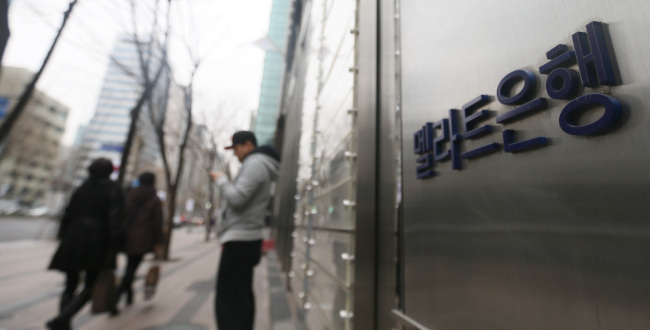Following the lifting of international sanctions on Iran, Korean companies are expected to rush to explore business opportunities in the resources-rich country, with constructors and oil refineries at the vanguard.
The Korean government is also moving swiftly to respond, scrapping Sunday a local rule that forced Koreans to seek prior central bank permission for any financial transaction with Iran.
 |
Tehran-based Mellat Bank's branch office in Seoul (Yonhap) |
Korea, in September 2010, joined world powers in punishing Iran for its nuclear program, putting over a hundred Iranian organizations and 24 individuals, including Tehran-based Mellat Bank, on a list banning all financial transactions.
The sanctions ended Saturday following an agreement struck in Vienna between Iran and the U.S. and five other world powers.
“As of now, Korean companies are free to engage in trade with Iran with almost all items, with the exception of strategic goods such as arms and nuclear-related items,” the Finance Ministry said in a statement Sunday.
The news was hailed by Korean builders which have been grappling with a sharp drop in construction orders from the Middle East.
Overseas construction orders received by local firms in 2015 fell to the lowest level in five years, $46.1 billion, which was about 70 percent of the previous year’s level. Orders from the Middle East nearly halved to $16.5 billion, as oil-producing nations shun large construction projects on a free fall in crude prices.
Before Korea joined the sanctions, Iran was a land of opportunities for local builders, with the country holding the world’s fourth-largest proved crude oil reserves and the world’s second-largest natural gas reserves. The country was the No. 6 market for Korea in terms of the amount of construction deals clinched by local builders.
“Korean builders are ready to start efforts to seize opportunities immediately upon the lifting of the sanctions,” an official at Daelim Industrial was quoted by Yonhap news agency. “Having led several large-scale construction projects in Iran, they have sound track records and reputation among Iranian business partners.”
Daelim and other builders such as Hyundai Engineering & Construction and GS Engineering & Construction have retained their offices in Tehran despite the sanctions, Yonhap said.
The opportunities could be massive.
Years of economic isolation are said to have stymied the Mideast country’s industrial development, leaving infrastructure and oil and gas fields underdeveloped and out of date. With a population of 77 million, it is also the region’s second largest consumer market.
Korea’s Ministry of Land, Infrastructure and Transport in August sent a government delegation to the Islamic Republic, headed by Yoo Il-ho, then transport minister and now finance minister, to support local firms’ business activities there.
Korea’s oil refiners are also looking at the opportunities in the country.
SK Innovation and Hyundai Oilbank had reduced oil imports from Iran following the sanctions, but are likely to increase them going forward, as part of diversification of sources. Before sanctions, the companies sourced nearly 15 percent of its entire fuel purchase from the country.
By Lee Sun-young (
milaya@heraldcorp.com)








![[Today’s K-pop] Blackpink’s Jennie, Lisa invited to Coachella as solo acts](http://res.heraldm.com/phpwas/restmb_idxmake.php?idx=644&simg=/content/image/2024/11/21/20241121050099_0.jpg)